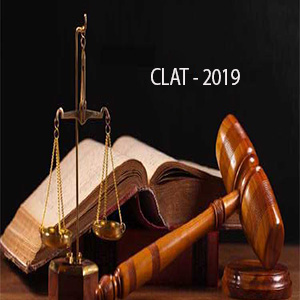CLAT 2019: Important Dates, Eligibility and Exam Pattern
 The registration for Common Law Admission Test - CLAT has started from 13th January, 2019. Candidates who are ready for taking law as profession are needed to qualify into this entrance examination test for studying undergraduate and post-Graduate law courses. For 2019 CLAT registration candidates need to visit the official website clatconsortiumofnlu.ac.in. This year the National Law School of India University Odisha will conduct the examination on May 12. Qualifying the examination candidates will have a chance of studying undergraduate courses in BA LLB, BBA LLB, B.COM, B.Sc LLB and BSW LLB. CLAT also offers LLM course to post-graduate candidates.
The registration for Common Law Admission Test - CLAT has started from 13th January, 2019. Candidates who are ready for taking law as profession are needed to qualify into this entrance examination test for studying undergraduate and post-Graduate law courses. For 2019 CLAT registration candidates need to visit the official website clatconsortiumofnlu.ac.in. This year the National Law School of India University Odisha will conduct the examination on May 12. Qualifying the examination candidates will have a chance of studying undergraduate courses in BA LLB, BBA LLB, B.COM, B.Sc LLB and BSW LLB. CLAT also offers LLM course to post-graduate candidates.
Candidates need to fill their name, mobile number, email address and password in the registration form. Candidates will receive an OTP in the registered mobile number. The OTP will allow the candidates to proceed further.
In the next step of registration candidates are required to fill their personal details, communication details and educational background, and in the following step candidates are required to upload a photograph, picture of signature and state of domicile certificate.
Candidates are required to pay the registration fee based on which application form is submitted. The fee for general, pwd, obc category students is Rs 4000 and for sc/st candidates is Rs 3500.
Important Dates:
|
EVENTS |
DATES |
|
Registration Beginning |
January 13, 2019 |
|
Registration Closing |
March 31, 2019 |
|
Last date of downloading application form |
Second week of May, 2019 |
|
Online Fees Payment |
13th January to 31st March |
|
Issue of admit card |
3rd week of April |
|
CLAT Examination |
May 12, 2019 (3pm-5pm) |
|
Result |
Last week of May, 2019 |
Examination Pattern (UG):
CLAT 2019 is a pen and paper examination and candidates will be given two hours time for solving the MCQ question paper. There will be 200 questions in total carrying 1 mark each. Candidates will be negatively marked with 0.25 for each wrong answer.
The below table will give the candidates a better idea of marking scheme and subjects.
|
SUBJECTS |
MARKS |
TOTAL NUMBER OF QUESTIONS |
|
English (comprehension) |
40 |
40 |
|
General Knowledge and Current Affairs |
50 |
50 |
|
Elementary Mathematics (numerical ability) |
20 |
20 |
|
Legal Aptitude |
50 |
50 |
|
Logical Reasoning |
40 |
40 |
Examination Pattern (PG):
Time allotted for the postgraduate entrance examination is 2hrs. The examination will have 3 sections with a total of 150 MCQs. For every right answer candidates will be awarded 1 mark and for every wrong answer candidates will lose 0.25 marks.
Below table depicts the distribution of marks and the subjects.
|
SUBJECTS |
MARKS |
TOTAL NUMBER OF QUESTIONS |
|
Constitutional Law |
40 |
40 |
|
Law Subjects Contract, Torts, Criminal Law, International Law, IPR and Jurisprudence |
60 |
60 |
|
Subjective questions (2) |
50 (25 each) |
2 |
Eligibility Criteria:
Educational Qualification for UG Students:
Candidates are must have a 10+2 degree with a minimum 45% marks (general, obc, pwd). SC/ST students need to have 40% marks in their 10+2 level.
Candidates appearing for any intermediate exam are also eligible to apply for CLAT 2019.
Educational Qualification for PG Students:
Candidates must have completed graduation in LLB/5 year integrated LLB/Equivalent degree with a minimum of 55% percent marks (general, obc, pwd). Candidates belonging to sc/st category need to have 50% percent marks.
Candidates appearing for final year examination can also apply.
Age Limit
The Supreme Court has declared there will be no upper age limit for candidates appearing for CLAT 2019.

